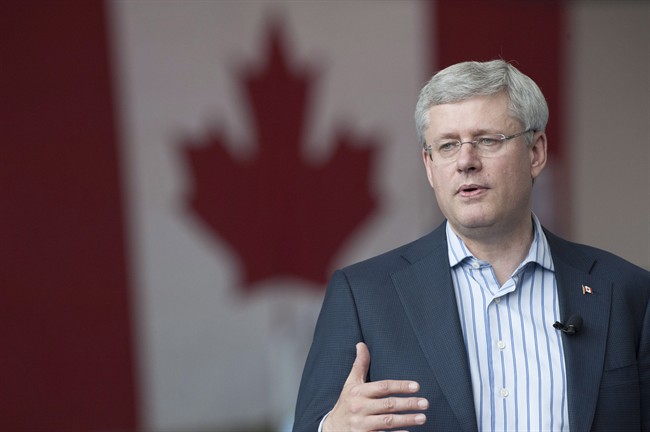OTTAWA – Stephen Harper is fishing for voters, and he’s going back to familiar ponds.

Groups that have long been regarded as the Conservative Party’s base of support have been getting extra attention as the 2015 election grows nearer.
Take Sault Ste Marie, where the prime minister is today, taking part in a Q-and-A session moderated by the Ontario Federation of Anglers and Hunters — an event organized inside the Prime Minister’s Office. The government’s record on wetlands conservation and support for gun owners will not escape mention.
On Thursday, for example, Fisheries Minister Gail Shea announced the latest phase in a $25 million recreational fishing conservation program.
Part of the Conservative success story has been speaking to Canadians that the other federal parties have tended to overlook. On social issues, the party has no competition on the right side of the spectrum. It recently used the phrase “traditional family values” in an email survey sent out to members, and has balked at the NDP’s proposal for a national child-care program.
“Our government believes that parents know what is best for their children. The NDP disagree,” Social Development Minister Candice Bergen tweeted this week.

Get daily National news
Policies that resonate in rural ridings in particular have helped send a number of MPs to Ottawa. Support in those constituencies is being rallied again.
The party unveiled a separate website last month entitled “Safe and Sensible Firearms Policies,” featuring a photo of two men in jeans walking through a field with rifles slung on their shoulders.
“We’re proud to be the government that stopped treating hunters and farmers as criminals, and we’re proud to be the only party that promotes safe and sensible firearms legislation,” the website says. The government recently introduced legislation to ease some of the restrictions around firearms licensing.
The government recently directed the RCMP to reverse its decision to replace muskrat-fur hats with wool tuques.
“Our government will always stand up for Canada’s hunters and trappers,” Environment Minister Leona Aglukkaq told the Commons.
Bob Sexton, managing editor of Outdoor Canada, said the Conservatives have managed to display a level of understanding of the history and traditions that are tied up in hunting and fishing.
“A lot of our readership is in a rural part of Canada. Often, a lot of these issues are city versus country, or rural versus urban,” said Sexton.
“Maybe politicians who don’t really connect with that rural element don’t do as well in an outdoors community…There’s also a disconnect between what people in cities think happens in the fishing and hunting world.”
But in order to secure another majority, the Conservatives must win over more than just their core supporters — pegged at somewhere around 30 per cent.
To make up the next eight to ten per cent, Harper is treading familiar ground with an economic message that is focused on job creation, tax cuts and overall stability.
Last week, Harper chose Whitby, Ont., to announce the government would double the tax credit families can claim if their children are in sports. At the beginning of the month, he sat down with the Mississauga and Brampton boards of trade.
Voters in those ridings in the coveted 905 region around Toronto helped the Conservatives secure a majority in 2011.
Sandra Buckler, a former director of communications for Harper, says his recent travel is just an example of an activist prime minister at work.
“I know from direct experience that he likes to get out and talk about a lot of issues that matter to a lot of Canadians — for me, I know it’s jobs, I know it’s the economy… and standing up for Canada and Canadian values at home and away,” said Buckler, vice-president of Bluesky Strategy Group.







Comments